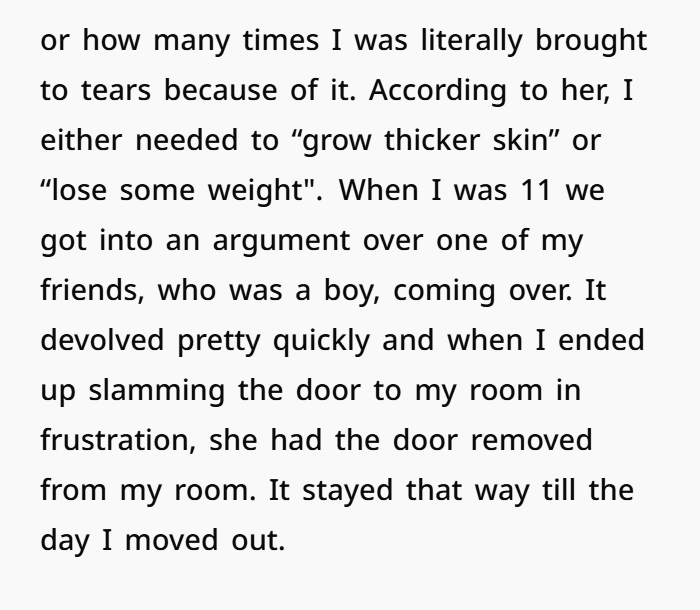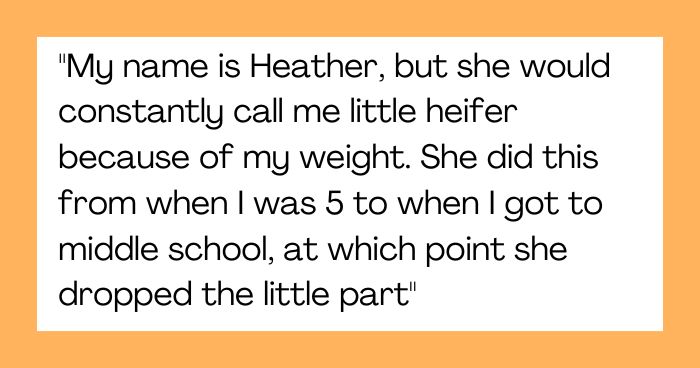Stepmother’s Abuse Left Scars, and Her Decline Brings Me Relief—Am I the Villain for Feeling This Way?
This is a heavy one. The story follows years of nonstop verbal abuse from a stepmother. We’re talking name-calling, cruel accusations, sabotage, constant gaslighting… the whole toxic family package. The kind of emotional abuse that cuts so deep, it follows you into adulthood.
Now grown, the narrator finally cut ties. Not just with the stepmother, but with the family members who stood by, ignored the abuse, or piled on their own neglect. It wasn’t easy, but it was survival. Sometimes healing childhood trauma means walking away for good.
But here’s the twist—now the stepmother is in the hospital, dying. And suddenly the family wants the narrator to come back, “make peace,” forgive and forget. They claim the stepmother has changed.
But forgiveness doesn’t erase scars. The narrator remembers the insults that broke her down. The stolen privacy. The constant blame. The years of feeling small and unloved in her own home. That doesn’t just disappear because someone is now frail in a hospital bed.
Instead of guilt, she feels something else—relief. Relief that the woman who traumatized her, who drained her spirit with toxic family dynamics, will never be able to hurt anyone again. And yeah, she admits that might sound harsh to outsiders. But when you’ve lived through gaslighting in families and narcissistic abuse, your view of forgiveness looks different.
The truth is, she doesn’t owe her abuser a final visit. She doesn’t owe the family closure. What she owes is to herself—her peace, her healing, her boundaries. Because sometimes walking away isn’t cruelty. It’s self-preservation.
What goes around comes around, but this time, it did a full marathon, came back, and waved a flag in victory

The author recounted her stepmother being so mean to her ever since she was five years old





















Navigating Trauma, Boundaries, and Forgiveness
When someone hurts you for years, your reaction isn’t random. It’s trauma. It’s survival. People love to say “forgive and heal,” but the truth is… forgiveness isn’t always possible. And even if it is, not everyone is ready or willing to give it. Sometimes the pain is just too deep to ever really forget.
The Long-Lasting Impact of Emotional Abuse
Her stepmother’s abuse wasn’t a one-off fight. It was years of verbal attacks, emotional neglect, gaslighting, and cruelty. She grew up being told she was unwanted, undeserving, even treated like she was less than human. That’s not something you just “get over.”
Studies from the American Psychological Association show that emotional abuse leaves scars just as deep as physical abuse. It destroys self-esteem, wrecks trust in relationships, and fuels lifelong anxiety or depression. So her struggle to let go isn’t weakness. It’s not bitterness. It’s simply what happens when you’ve survived toxic family dynamics and constant emotional violence.

Forgiveness Is Personal, Not Obligatory
Here’s the thing: forgiveness is personal. It’s not something you can demand from someone. Her family telling her to “move on” or “make peace” is really just dismissing her pain. It puts the responsibility of fixing everything back on her shoulders, when she’s already the one who carried the trauma.
As psychologist Dr. Janis Abrahms Spring says, forgiveness can’t be forced. It has to come naturally, from a place of truth. And if it never does? That’s valid. Healing from emotional abuse doesn’t always mean forgiving the abuser. Sometimes healing means choosing yourself.
Setting Boundaries with Toxic Family Members
Cutting ties was her first step toward real healing. She walked away from her stepmother, father, and half-sister—and honestly, that boundary-setting is powerful. Experts at Psychology Today say creating boundaries is one of the most important tools when dealing with toxic family members.
Yes, her family may want closure. They may want a “final goodbye.” But she has every right to put her mental health first. Saying no doesn’t make her cold. It makes her strong enough to protect herself.
Complex Feelings Toward an Abuser’s Decline
Now, here’s where it gets complicated. When an abuser loses their power—whether that’s old age, illness, or even death—it’s normal for survivors to feel relief. Some even feel comfort, maybe even a twisted sense of peace. It might sound harsh, but those feelings are valid. They come from years of pain and being silenced.
Coping with childhood trauma isn’t clean or pretty. Sometimes you don’t feel sad for the abuser. Sometimes you feel free. Therapy, journaling, or talking it out with someone you trust can help sort those emotions. But either way, she doesn’t owe her abuser forgiveness. She doesn’t owe her family reconciliation. What she owes is to herself—her peace, her future, her healing.
Netizens believe the author has every right not to want to visit her stepmother at the hospital and resorted to dark humor








